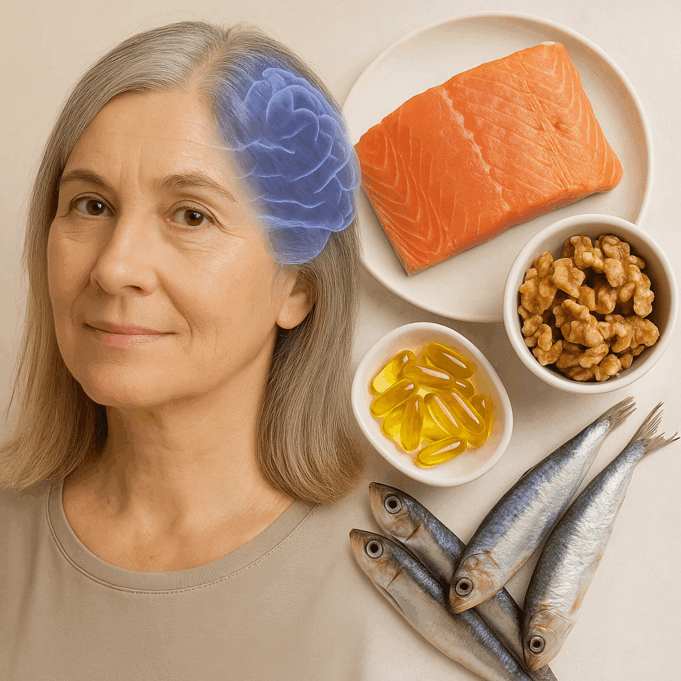Your brain health is as critical as your heart health. While you track your steps and cholesterol, don’t overlook the organ that drives memory, personality, and your connection to loved ones, especially regarding Alzheimer’s disease.
Alzheimer’s disease affects over 6 million Americans, but here’s a striking fact: nearly two-thirds of those diagnosed are women. This isn’t just about living longer than men. Women face unique biological and hormonal factors that increase their vulnerability to this devastating condition.
Hope starts with nutrition. Research suggests omega-3 fatty acids, found in fish and select foods, may help shield your brain from Alzheimer’s. Learn how omega-3s offer protection, which foods are richest, and how to add them to your routine for maximum impact.
Why Women Face Greater Alzheimer’s Risk
Women don’t just represent more Alzheimer’s cases because they live longer. The numbers tell a more complex story.
According to the Alzheimer’s Association, a 65-year-old woman has a 1 in 5 chance of developing Alzheimer’s during her lifetime, compared to 1 in 10 for men. Several factors contribute to this disparity:
Hormonal changes play a significant role. The drop in estrogen during menopause affects brain function and may increase vulnerability to cognitive decline. Estrogen helps protect neurons and supports memory formation, so its decline creates a window of risk.
Genetic factors also matter. Women who carry the APOE4 gene variant,the strongest genetic risk factor for Alzheimer’s,show greater cognitive decline than men with the same gene.
Brain structure differences contribute too. Women’s brains typically have more connections between hemispheres, which may initially protect against damage. However, when Alzheimer’s strikes, it can spread more quickly through these extensive networks.
By understanding these unique risks, you can proactively reduce your Alzheimer’s risk—starting with omega-3 fatty acids.
The Science Behind Omega-3s and Brain Health
Your brain is nearly 60% fat, making it the fattiest organ in your body. The types of fats you consume directly impact brain structure and function. Omega-3 fatty acids are essential fats your body can’t produce on its own; you must get them from food.
Three main types of omega-3s benefit brain health:
DHA (docosahexaenoic acid) makes up 8% of brain weight and concentrates heavily in neural membranes. It supports neuron communication and helps maintain brain structure.
EPA (eicosapentaenoic acid) reduces inflammation throughout the body, including the brain. Chronic inflammation contributes to Alzheimer’s development.
ALA (alpha-linolenic acid) comes from plant sources and converts to DHA and EPA in small amounts.
Research reveals impressive protective effects. A 2022 study published in Neurology followed over 1,100 women for 30 years. Those with higher omega-3 levels showed larger brain volumes and better cognitive performance as they aged.
Another study in the Journal of Alzheimer’s Disease found that people with higher DHA levels had 49% lower risk of developing dementia. The protective effects were strongest among women.
How Omega-3s Protect Your Brain
Omega-3 fatty acids defend against Alzheimer’s through multiple mechanisms:
Fighting Inflammation
Chronic inflammation damages brain cells and accelerates cognitive decline. Omega-3s produce specialized molecules called resolvins and protectins that actively resolve inflammation. Think of them as your brain’s cleanup crew, removing harmful inflammatory compounds before they cause permanent damage.
Supporting Cell Membranes
Brain cell membranes need omega-3s to stay flexible and functional. These healthy fats help neurons communicate efficiently and maintain proper ion balance. Without adequate omega-3s, cell membranes become rigid and less responsive.
Reducing Amyloid Plaques
Alzheimer’s disease involves the buildup of toxic amyloid plaques in the brain. Studies suggest omega-3s may help prevent plaque formation and even promote their clearance. DHA appears particularly effective at reducing amyloid accumulation.
Promoting Neuroplasticity
Your brain’s ability to form new connections,neuroplasticity,
Protecting Against Oxidative Stress
Free radicals damage brain cells over time, contributing to aging and disease. Omega-3s enhance your brain’s antioxidant defenses, reducing oxidative damage and preserving neural function.
Best Food Sources of Omega-3s
You don’t need expensive supplements to boost your omega-3 intake. Many delicious foods provide these brain-protective fats:
Fatty Fish: The Gold Standard
Cold-water fish offer the highest concentrations of EPA and DHA:
Salmon provides about 1,500mg of omega-3s per 3.5-ounce serving. Choose wild-caught when possible for the highest nutrient content.
Mackerel delivers an impressive 2,600mg per serving, making it one of the richest sources available.
Sardines pack 1,400mg per serving plus calcium from their edible bones. They’re also low in mercury and sustainably sourced.
Anchovies contain 1,200mg per serving and add savoury flavor to salads and pasta dishes.
Herring offers 1,600mg per serving and costs less than many other fatty fish options.
Plant-Based Sources
Vegetarians and vegans can get omega-3s from these foods:
Flaxseeds contain 2,300mg of ALA per tablespoon. Grind them fresh for better absorption.
Chia seeds provide 1,900mg per ounce and add texture to smoothies and yogurt.
Walnuts deliver 2,500mg per quarter-cup serving and make convenient snacks.
Hemp seeds contain 1,200mg per tablespoon plus complete protein.
Algae oil offers EPA and DHA from the same source that fish get their omega-3s. This supplement works well for vegans.
Other Sources
Eggs from pasture-raised hens contain higher omega-3 levels than conventional eggs.
Grass-fed beef provides some omega-3s, though much less than fish.
Fortified foods like certain yogurts and milk offer additional options.
Omega-3 fatty acids offer one of the most promising and accessible ways to protect your cognitive health. The research is compelling, the foods are delicious, and the benefits extend far beyond brain protection.













